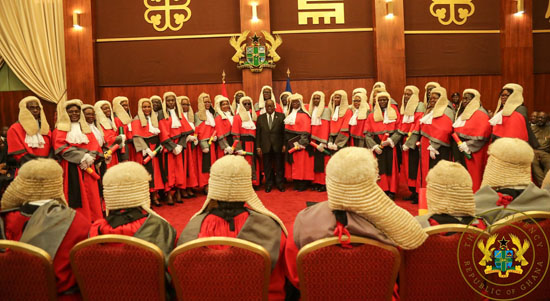
Worships, Honours, Lordships, with their Ladyships - Inspired by a friend
At the weekend, a friend of mine was sworn in as a judge. This is a friend who is gentle in spirit. Well, I had to call her and find out whether or not she would have the heart when sentencing, to send anyone to jail!
She laughed. But I knew she could, because she has another characteristic. She is firm.
Advertisement
Teasingly, I asked her about her posting and expressed the hope that it would be within my sphere of social engagements to fall under her jurisdiction.
My intention was to commit a misdemeanour and be hauled before her court, so I could test her mettle through participating and observing.
I knew it would be preposterous because we are always laughing together and my bet was, she would see me in her court and burst out laughing with the exclamation, “Oh! Caro!!!”
Concluding our conversation, I asked, “So how will you be referred to in court?”
She told me that a judge of the superior courts, from the High Court and above, were referred to as ‘your lordship’ or ‘your ladyship’; those in the district court as ‘your worship’ and those in the circuit courts as ‘your honour’.
“Would you be comfortable with that?” I joked. All these titles have connotations, suggesting that the person being referred to has the attributes of a deity or is one.
By her responses, I sensed she was not one to rock the boat in the new function as a judge.
Titles
Lordships, ladyships, honours and worships were bequeathed on Ghana by the English.
In 1843, by the British Settlement Act, orders/laws were made by Her Majesty for the establishment of laws, institutions and ordinances for peace, order and the good government of the ‘subjects’ of the Crown and others within the settlements in the African Coast.
Some of those laws and practices have been with Ghana since. So we have the practice of the titles and we also have the practice of the worn-out and musty wigs, robes and conventions.
But while some of the laws have phased out by our evolution as a people, the titles, the wigs and the robes in our hot climate are yet to see any challenge from anyone.
Indeed, methinks that in spite of the burden of wearing the musty wig or robe in a hot country like ours, and sweating profusely underneath, our lawyers and judges relish the garments as they make them distinct and stand out.
So they would rather continue with these relics of the past than distinguish themselves in seminal thought!
Even the Ghana Police Service, a decade ago, thought it wise to change the black operational uniform to a bluish hue.
Historically
Historically, in the United Kingdom, lawyers were appointed by the King (Kings Counsel – KC) or Queen (Queens Counsel – QC), to be part of his or her Counsel, learned in law.
Preposterously, lawyers appointed KCs or QCs, which were honorific titles, wore silk gowns of a particular design in conformity, perhaps with the taste and idiosyncrasies of the monarch.
With women, characteristically, loving more silk, with the flurry and fancy, being appointed by the Queen, might have meant more silk adornments and, hence, being known informally as receiving, obtaining or taking silk, with those appointed called ‘silks’.
The honorific KC and QC extended into courts, with people using worships, honours, lordships and ladyship in reverence to these ‘high and lofty’ ones, found almost like gods, to be appointed as such!
Today, in most countries, “justice emanates from the people (1992 Constitution) and not a monarch. Our practices must, therefore, reflect this. Away with the gowns and wigs! Let’s keep things simple and within reach of all.
A simple ‘Sir’ or ‘Madam’, I believe, will suffice as titles in our courts.
Writer’s E-mail: [email protected]



